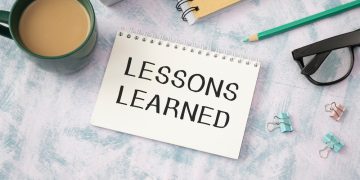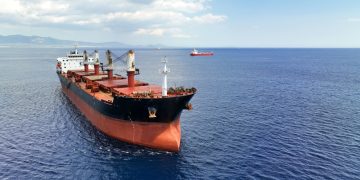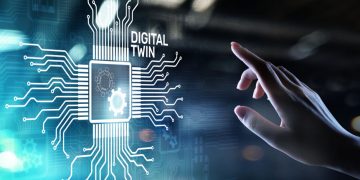During the 2023 CAREER4SEA Virtual Forum, speakers on a dedicated panel discussed how the industry can meet the expectations of millennials, who are technologically savvy and require modern working environments fostering a culture of sustainability, supporting diversity, and offering the latest technologies
In the panel discussion, moderated by Anastasia Kypriotaki, News Editor, SAFETY4SEA, the following stakeholders shared their perspectives: Capt. Christos Gianneios, Crew Manager, Niovis Shipping Co. S.A.; Ben Darnton, Director, Halcyon Recruitment; Panagiotis Konstantopoulos, Deputy Crew Manager, Maran Tankers Management Inc; Amalia Marcou, Crew Director & HR Manager, Enesel Dry SA and Katerina Tzimogianni, Human Resources Business Partner, V. Ships Greece Ltd.
Starting the discussion, speakers agreed that, nowadays the vessels are technologically advanced offering improved connectivity in terms of speed and quality with the shore. This is a game changer for young people who are familiar with technology, active on social media and learn many things from the internet.
This means that they need a new approach to training while also seeking flexibility in their working environment and finding reliable companies that prioritize environmental concerns, care for their employees, and support sustainability. It is worth noting that the aforementioned challenges are not unique to the maritime industry but to all industries.
Understanding the young generation
“We need to make sure that our people stay engaged and connected to the purpose and passion of each company. So, we need to challenge them, train them, give them the technology they need because that is what they are used to.”, Katerina Tsimogianni said.
Moving on, Ben Darnton argued that shipping is entering a phase where we will witness more complex ships and more automation. The positive news is that they may overcome some of the safety challenges with future fuels through automation.
Digitalization and automation will be something that millennials can help us with in the future.
…he said.
Apart from automation and technology, Panagiotis Konstantopoulos highlighted another challenge to consider: the diversity of the crew working on ships today. In the past, shipping did not have as many women on board the ships. Now, we see more women joining the crews, as well as individuals from various nationalities.
Millennials have a different way of approaching personal relationships, respecting one another, and working together, which wasn’t as prevalent in the past,
…observed Konstantopoulos.
‘’I believe that millennials are highly skilled in digital technology, so they will help the industry a lot in problem-resolving or adjusting new training methods in the future.’’ Amalia Marcou added and other speakers also agreed that this generation brings many opportunities and challenges at the same time.
In particular, as Katerina Tsimogianni commented: ‘’In this generation, I think that being so tech-savvy and bringing all this thirst to become better and do things in a different way, may help our industry to be more open to new things, like respecting hierarchy or speaking up lines that many companies have included in their policies. There will be challenges, and we will be there to face them and make everyone feel included in the company.’’
Progress on upskilling and reskilling maritime professionals
The maritime industry has demonstrated significant strides in embracing and upskilling its professionals to meet the demands of modernization. Lessons learned indicate that a proactive approach to technology integration and continuous learning is key. Training programs tailored to bridge the generation gap and nurture digital literacy have proven effective.
Konstantopoulos stated that the maritime industry is consistently training and working with its personnel; the better the training for individuals, the better the quality of work, and consequently, the better the performance of the ship. “I believe that the industry has succeeded in embracing and upskilling maritime professionals. We offer online training that can be completed at one’s own pace and convenience, covering various topics ranging from hard skills to soft skills. Therefore, individuals who seek self-improvement can access a wide array of resources online,” added Tzimogianni.
Capt. Gianneios further stated that…
Shipping is like the sea: It moves and changes and goes with the wave of its time and generation. As the time evolving and the training characteristics evolving also, we are trying every time to catch and catch up the feeling of each generation and do the best for our seafarers.
A holistic approach to sustainable skill strategies is needed
Additionally, sea operators should adopt a holistic approach to develop a sustainable skill strategy for their crew onboard. Prioritize team spirit, effective communication, and soft skills training to prevent misunderstandings and enhance overall safety. Top of Form
Tsimogianni said that it is very crucial, shipping industry to focus on the team spirit on board vessel. In the maritime industry, being able to communicate effectively and prevent intercultural misunderstandings can be a matter of life or death. ‘’We can help our people communicate effectively by being active listeners, by asking questions, by understanding if they are indeed well or if they face some problem.’’, she noted.
‘’We can also use our critical thinking in order to make the right decision or we can develop our emotional intelligence to understand our emotions and our colleagues’ emotions in order to help them. By developing all these soft skills and by having the right leaders in the right place, the crew onboard will be much safer and happier to do their job. ‘’, she added.
Speakers emphasized that maritime stakeholders ought to prioritize employee engagement, ensuring that those on board feel integral to the company. They should actively listen to their needs and offer assistance in addressing both technical challenges and interpersonal issues as they arise.
In conclusion, as the maritime sector navigates a future marked by automation and sustainability, the call for holistic skill strategies, encompassing both technical expertise and soft skills, becomes ever more crucial. By embracing these principles, ship operators can ensure a resilient and dynamic workforce, ready to sail the industry into a prosperous and inclusive future.
Explore more by watching the video herebelow


































































